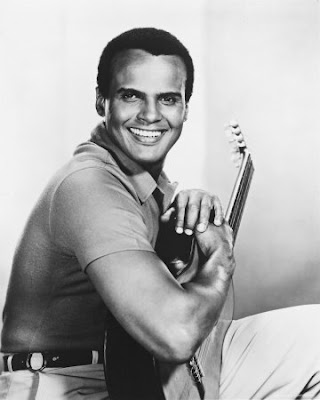Singer, actor and activist Harry Belafonte died Tuesday, April 25, at his home on the Upper West Side of Manhattan. The cause of his death was congestive heart failure. He was 96.
Belafonte popularized calypso music worldwide in the 1950s, earning the sobriquet “The King of Calypso.” He brought his rich baritone to classics such as “Day-O (The Banana Boat Song),” “Jamaica Farewell,” “Jump in the Line” and “Matilda.” His groundbreaking album Calypso (1956) was the first LP to sell over a million copies, and it spent an amazing 31 weeks atop Billboard’s album charts. In 2018, Calypso was chosen by the Library of Congress for preservation in the National Recording Registry as being “culturally, historically or artistically significant.” Calypso was Belafonte’s second album to top Billboard’s album chart. His previous album, Belafonte (1955), also reached the summit of Billboard’s album chart, where it remained for six weeks. In addition to calypso, Belafonte's musical oeuvre included blues, gospel, folk, show tunes, mento and American standards. He won two Grammys and received a Lifetime Achievement Grammy in 2000. And he was inducted into the Rock & Roll Hall of Fame last year.
Belafonte smashed through racial barriers in both music and film. He became a big star in both mediums and was one of Hollywood’s first black leading men, starring in films like Odds Against Tomorrow, Island in the Sun, The World, the Flesh and the Devil and Otto Preminger's Carmen Jones. And he had supporting roles in notable films such as Robert Altman's Kansas City, Spike Lee's BlacKkKlansman and Uptown Saturday Night, which was directed by his good friend and fellow actor Sidney Poitier.
Belafonte also made his mark in television and on the stage. In 1960, he won an Emmy for Outstanding Performance in a Variety or Musical Program or Series for “The Revlon Revue: Tonight With Belafonte” on CBS. He was the first black person to win the prestigious award. And his work in the musical revue John Murray Anderson’s Almanac (1953 - ‘54) earned him a Tony Award for Best Featured Actor in a Musical.
 |
| Harry Belafonte and his close friend Dr. King |
Additionally, Belafonte helped organize the 1963 March on Washington. The singer/actor even flew in a planeload full of big-name Hollywood actors to participate in the historic march. Moreover, Belafonte often provided funds to help bail King and other civil rights activists out of jail. And his palatial apartment served as a refuge for King and his family whenever they were in New York. Belafonte performed at the civil rights leader’s 1967 fundraiser in Houston, Texas. It took place at the Sam Houston Coliseum, and more than 4,000 people attended. Aretha Franklin was the other featured performer at the event. It was King’s last visit to Houston.
Belafonte was also involved in civil and human rights campaigns outside of the U.S. For instance, he was heavily involved in the anti-apartheid movement in South Africa and even joined apartheid protesters outside the South African embassy in 1985. He and the other protesters were arrested. Belafonte also organized the 1988 concert to honor and call for the release of imprisoned South African anti-apartheid activist Nelson Mandela. The 10-hour concert took place at London’s Wembley Stadium with 70,000 people in attendance. The concert was broadcast globally and was viewed by 750 million people in 60 countries.
Additionally, Belafonte was the brainchild behind USA For Africa. The famine-relief project brought together 47 prominent music artists to record the benefit song “We Are The World.” The single sold 20 million copies worldwide and raised millions for famine relief in Africa–specifically Ethiopia.
Belafonte was a cultural advisor to the Peace Corps and a UNICEF Goodwill Ambassador. In 2013, he founded the civil rights organization Sankofa.org, which works toward eradicating systemic injustices in the United States.
Belafonte has received a host of honors and awards for his many humanitarian and civil rights efforts. In 1989, he received the Kennedy Center Honors, and in 1994, he was the recipient of the National Medal of Arts, which is the highest award given to artists and arts patrons by the United States government. Amnesty International honored Belafonte with its 2013 Ambassador of Conscience Award, and that same year, the NAACP awarded him its Spingarn Medal. It’s the NAACP’s highest honor. In 2014, he received the Jean Hersholt Humanitarian Award at the 6th Annual Governors Awards.
Belafonte was born in Harlem, New York on March 1, 1927 to Caribbean immigrants. His father, Harold George Bellanfanti Jr., a chef, was from Martinique, and his mother, Melvine, who worked as a housekeeper, was from Jamaica. He spent much of his youth in his mother's home country of Jamaica.
Belafonte not only had a massive impact on the entertainment world but also on civil and human rights. He recognized the immense power and influence that fame bestowed upon him. And he fully utilized it to try to improve the world around him. He represents the kind of celebrity that others should aspire to–one that uses their fame and platform to speak out against injustices whenever they can. Harry Belafonte set the standard for socially conscious celebrities and will be remembered just as much for his civil rights work and humanitarianism as his art.

No comments:
Post a Comment